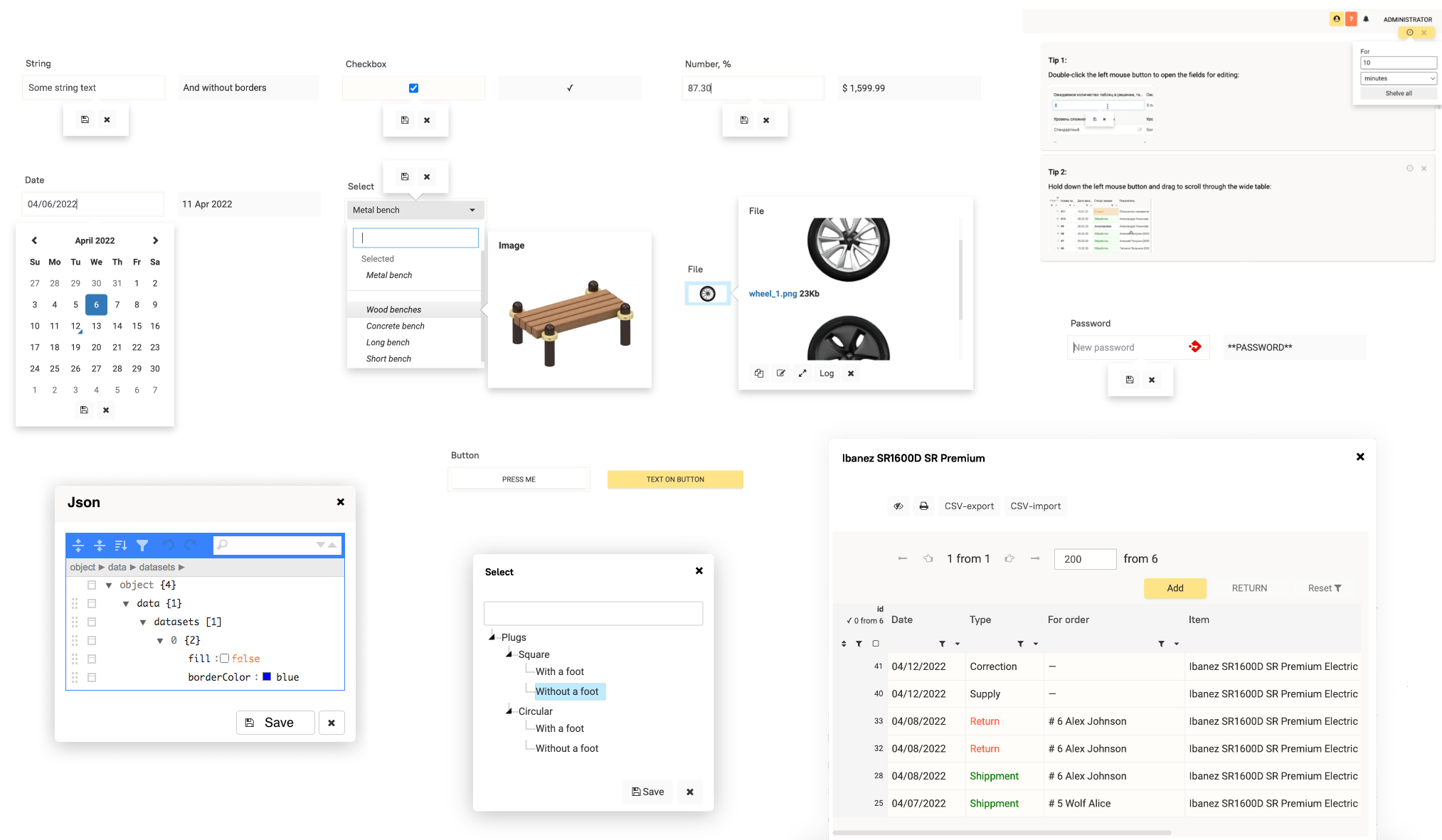13 Open-source Free Frameworks and Platforms for Building Business Applications Enterprise CRM/ ERP
Are You Truly Ready to Put Your Mobile or Web App to the Test?
Don`t just assume your app works—ensure it`s flawless, secure, and user-friendly with expert testing. 🚀
Why Third-Party Testing is Essential for Your Application and Website?We are ready to test, evaluate and report your app, ERP system, or customer/ patients workflow
With a detailed report about all findings
Contact us nowTable of Content
Many developers and enterprise organizations often find it necessary to have a strong and reliable foundation to build their applications upon. This includes having robust frameworks and platforms that can support their development needs. By having a solid foundation, developers can ensure the security and integrity of their data, as well as the scalability and up-to-date nature of their applications.
Having a reliable base for their apps not only provides stability but also allows for easier maintenance and future enhancements. Therefore, it is crucial for developers and enterprises to carefully consider the choice of their foundation, frameworks, and platforms to ensure long-term success and growth.
In this list, we collected the best open-source solid and usable frameworks and platforms for enterprise to build business apps.
With the following selections enterprise can build:
- CRM solutions
- ERP solutions
- Accounting solutions
- Secure file transfer and sharing systems
- Reporting systems
- Storage, warehouse and stock management systems
1- Totum
Totum is an online platform that offers a comprehensive set of tools and features for managing and conducting online courses, workshops, and webinars. It provides functionalities for creating and organizing course content, facilitating learner engagement and interaction, tracking learner progress, and conducting assessments.

2- Django ERP Framework
The Django ERP framework is a tool for managing various aspects of a business, such as inventory, sales, customer relationships, and human resources. It is built using Django, a Python web framework, and provides a set of pre-built modules and features that can be customized and extended to meet specific business needs.
3- Mosqui
Moqui is a GitHub repository that contains the Moqui Framework, an open-source enterprise resource planning (ERP) and business process automation (BPA) platform.
It is designed to streamline and automate various business processes, including inventory management, sales, finance, and human resources. The Moqui Framework provides a flexible and extensible architecture that allows businesses to customize and tailor the platform to their specific needs.
4- Frappie
Frappe is a GitHub repository that contains the Frappe Framework, an open-source full-stack web application framework. It is built using Python and JavaScript and provides a robust foundation for developing and deploying web applications.
The Frappe Framework offers features such as database management, user authentication, form rendering, and workflow management. It is highly customizable and suitable for building a wide range of applications, including ERP systems, CRM systems, and project management tools.
5- Moqui Framework
Moqui Framework is an open-source enterprise resource planning (ERP) and business process automation (BPA) platform. It is designed to streamline and automate various business processes, including inventory management, sales, finance, and human resources.
The Moqui Framework provides a flexible and extensible architecture that allows businesses to customize and tailor the platform to their specific needs.
6- Ever Gauzy Platform
Ever Gauzy Framework is an open-source platform for managing and automating various business processes. It offers features such as inventory management, sales tracking, finance management, and human resources management.
The Ever Gauzy Framework provides a flexible and customizable architecture that allows businesses to tailor the platform to their specific needs.
7- Supaglue
Supaglue Framework is an open-source platform for building and managing web applications. The Supaglue Framework offers features such as database management, user authentication, form rendering, and workflow management.
It provides a flexible and customizable architecture that allows developers to create web applications tailored to their specific needs.
8- TRACARDI
Tracardi GUI, a web-based interface for managing and configuring Tracardi, an open-source customer data platform (CDP). Tracardi GUI provides a user-friendly interface for creating and managing data pipelines, defining rules and conditions, and analyzing customer data.
It allows businesses to collect, store, and process customer data to gain insights and improve marketing and customer experiences.
9- dArray
The DArray Decentralized Accounting Software is specifically designed for makers, freelancers, and small and medium-sized enterprises (SMEs) to manage their accounting processes in a decentralized and secure manner.
DArray aims to provide a user-friendly platform that allows users to track expenses, generate invoices, manage payments, and maintain financial records. With its decentralized architecture, DArray offers enhanced data privacy and control, making it a suitable choice for individuals and businesses seeking a secure accounting solution.
10- archetypes
Commonality Archetypes is a GitHub repository that contains a collection of software design patterns and architectural archetypes. It provides a set of reusable solutions for common software design challenges. Some of its key features include:
- Reusable Design Patterns: The repository offers a variety of design patterns that can be applied to different software development scenarios. These patterns provide proven solutions for common design problems and help improve the overall quality and maintainability of software systems.
- Architectural Archetypes: Commonality Archetypes also provides architectural archetypes, which are high-level design templates that define the structure and organization of a software system. These archetypes serve as starting points for designing specific types of applications, such as client-server systems, microservices architectures, or event-driven systems.
- Documentation and Examples: The repository includes comprehensive documentation and examples for each design pattern and architectural archetype. This allows developers to understand how to apply these patterns and archetypes in their own projects and provides guidance on best practices and implementation details.
- Community-driven Development: Commonality Archetypes is an open-source project, and contributions from the community are welcome. Developers can collaborate, share their experiences, and contribute new patterns or archetypes to the repository, fostering a collaborative and innovative software design community.
11- Tabbled (Lowcode)
Tabbled is a powerful low-code platform that provides a comprehensive solution for building web applications for enterprises. It enables businesses to efficiently manage their internal processes, such as ERP, CRM, WMS, and more.
Features
- Drag-and-drop Form Builder: Easily configure the user interface by simply dragging and dropping elements.
- Extensive Data Sources: Tabbled offers built-in connections to various databases, including PostgreSQL, MySQL, MongoDB, and more, allowing seamless integration with existing data.
- Customizable Scripting: Take full control of your application by customizing it with JavaScript. This flexibility enables you to tailor the application to your specific business needs.
- Powerful Functions: Tabbled provides a range of cloud functions that allow you to evaluate complex business logic. This empowers you to automate processes and optimize efficiency.
- Enhanced Permission Control: Ensure the security of your data and control user access with Tabbled's advanced permission settings. Limit access to specific data or elements of the interface based on user roles and requirements.
- Real-time Data Synchronization: Tabbled ensures that every device accessing the application receives synchronized data in real-time. This provides a consistent and up-to-date user experience across all devices.
12- AppFlowy.io
AppFlowy is a web-based task management and note-taking application. It provides a simple and intuitive interface for creating and organizing lists, notes, and ideas. Users can create hierarchical lists with nested items, enabling them to break down complex tasks into smaller, manageable sub-tasks.
AppFlowy also supports tags and search functionality, making it easy to find and filter information. With its minimalist design and user-friendly features, AppFlowy is a popular choice for personal organization and productivity.
13- LIMBAS
Limbas framework is an open-source web-based application platform. It is designed to simplify the development of custom business applications and provides a range of features and tools to facilitate this process.
Key features of Limbas include:
- Rapid Application Development: Limbas offers a visual development environment that allows developers to quickly build and customize applications using a drag-and-drop interface. This accelerates the development process and reduces the need for extensive coding.
- Flexible Data Modeling: The framework provides a flexible data modeling system that allows developers to define custom data structures and relationships. This enables the creation of tailored database schemas that align with specific business requirements.
- Integrated Workflow Engine: Limbas includes a built-in workflow engine that supports the automation and management of business processes. Developers can define custom workflows with various steps, conditions, and actions, providing a seamless and efficient workflow management system.
- User and Access Management: The framework includes user and access management features, allowing administrators to define user roles, permissions, and access rights. This ensures secure and controlled access to application data and functionality.
- Reporting and Analytics: Limbas offers built-in reporting and analytics capabilities, allowing developers to create custom reports and generate insights from application data. This enables data-driven decision-making and analysis within the application.
- Customizable User Interface: The framework provides tools for customizing the user interface, including themes, layouts, and widgets. This allows developers to create visually appealing and user-friendly interfaces that align with the branding and requirements of the application.
Overall, Limbas is a powerful framework for building web-based business applications with a focus on rapid development, flexibility, and customization.
These frameworks and platforms provide powerful tools for building enterprise CRM/ERP systems and RAD (Rapid Application Development) applications. They offer features such as data management, workflow automation, user authentication, and customizable interfaces, allowing businesses to tailor the applications to their specific needs.












